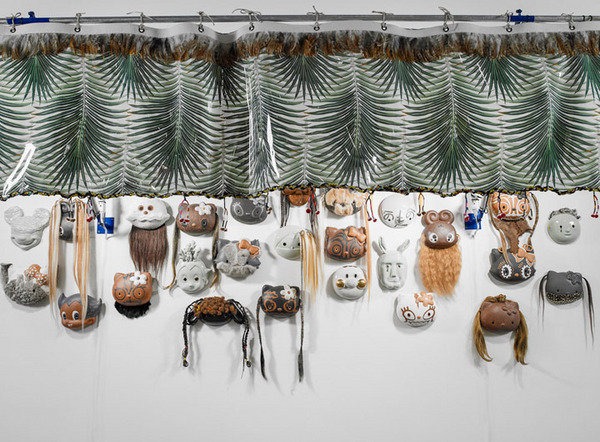Cultural Transference
dal 14/6/2012 al 26/7/2012
Segnalato da
Firelei Baez
Matthew Cowan
Hubert Czerepok
Nicolas Dumit Estevez
Pablo Helguera
Christopher K. Ho
Yoko Inoue
LoVid
Umesh Maddanahalli
Dread Scott
Kyle Goen
Allison Smith
Juliana Irene Smith
Shinique Smith
Elisabeth Smolarz
Sara Reisman
14/6/2012
Cultural Transference
Efa Project Space, New York
The exhibition features video, sculpture, performance, installation, collage, and craft-based projects by sixteen artists who draw from the cultural references and contexts of Afghanistan, the Caribbean, China, India, Iraq...

curated by Sara Reisman
Artists: Firelei Baez, Matthew Cowan, Hubert Czerepok, Nicolas Dumit Estevez, Pablo Helguera,
Christopher K. Ho, Yoko Inoue, LoVid, Umesh Maddanahalli, Dread Scott and Kyle Goen, Allison Smith,
Juliana Irene Smith, Shinique Smith, and Elisabeth Smolarz
Cultural Transference presents recent artwork by sixteen international and New York-based artists
whose practices are actively engaged with the transformation of culture in contemporary art and
everyday life. Through transactions and exchanges – social, spiritual, economic, and political –
artworks featured in the exhibition collectively express how cultural practice is reciprocally changing
and being changed by its context. Depending on the mobility of those in the role of producing
culture and those who consume it, the transmission of culture can move quickly or slowly through
space and time.
The exhibition features video, sculpture, performance, installation, collage, and craft-based projects
by artists who draw from the cultural references and contexts of Afghanistan, the Caribbean, China,
India, Iraq, Japan, Mexico, New Zealand, Palestine, Poland, and the United States, among other
places. Together, the artists' projects communicate the areas where cultures and cultural production
mutate, are appropriated, and remixed resulting in experiences that push against stereotypes, and
defy the logic of accepted cultural mores.
There are several aesthetic and conceptual parallels and intersections amongst the artists’ processes.
A number of the artists use collage techniques to convey the potential for cultural acceptance and
change. From Firelei Baez's collages on book pages to Shinique Smith's assemblages that
incorporate discarded objects and graffiti, and Yoko Inoue's masks which collapse aspects of pop,
spiritual, and commodity culture, one can perceive shifts and recombinations of cultural references,
both abstract and literal.
Hubert Czerepok's film and companion light installation question the stability of ideological symbols
and positions, while LoVid's video objects and digitally produced and handcrafted textiles blur visual
information into possibilities for new folk art. Allison Smith and Matthew Cowan have long
explored folk traditions through artistic means: performance, sculpture, video, craft, and other
ephemera. Cowan’s projects highlight the peculiarity of long practiced customs, toeing a fine line
between homage and parody, while Smith’s recent collages examine the fetishization of patriotic
objects suggestive of colonial era American craft. In a related vein, Pablo Helguera’s has long
focused on the preservation of cultural traditions and languages on the verge of disappearance.
Works by Christopher K. Ho and Elisabeth Smolarz consider the nature of labor in relation to
geographic location. Highlighting the gaps between the creative and working classes, their works
reflect on how the location of production informs its value in the greater economy.
Of course, there are times when cultural exchange is met with resistance from individuals,
institutions, and ideological camps. Dread Scott and Kyle Goen’s recent performance staged in
Times Square, entitled United We Stand Stand challenges post 9/11 patriotism in New York City
through the sale of nationalistic souvenirs, questioning the United States’ occupation of countries in
the Middle East. Umesh Maddanahalli and Juliana Irene Smith both offer more specific narratives in
which the boundaries of cultures become apparent. Smith, whose artwork is concerned with human
desperation and the politics of belonging, has recently produced paintings that extend to sound and
sculptural installations reflecting on the prescience of Mark Twain’s literary excursion to the Holy
Land. In a contemporary European context, Maddanahalli’s project humorously examines how
national identification might play out in private life.
Dominican-born Nicolas Dumit Estevez’s Born Again is a community-engaged, performative act of
becoming. In the spring of 2011 he set out on a journey through various community spaces in the
Bronx, culminating in being born again as a native Bronxite in a ritual along the banks of the Bronx
River. Estevez’s project demonstrates that transformation is possible, so long as it is not imposed by
external forces.
Curator's bio:
Sara Reisman is Director of New York City's Percent for Art program which commissions
permanent artworks for City-owned public spaces. Recently commissioned artists include Mary
Miss, Ben Rubin, Odili Donald Odita, Karyn Olivier, Tattfoo Tan, and Mary Mattingly, among
others, all working in diverse media and themes. Reisman has organized exhibitions and written
about public engagement and public art, social practice, the aesthetics of globalization, and site-
specificity for the Philadelphia Institute of Contemporary Art, Queens Museum of Art, The Cooper
Union School of Art, Smack Mellon, The Bronx Museum of Art, Socrates Sculpture Park, Momenta
Art, Aljira, the Kunsthalle Exernergasse, and the Museum of Contemporary Art, Banjaluka, Republic
of Srpska, among others. Reisman was the 2011 Critic-in-Residence at Art Omi, an international
visual artist residency in upstate New York, and is the inaugural guest curator in 2012-2013 at
Forever & Today.
Image: Yoko Inoue, The Seven Transformations of Hello Kitty, 2010.
For press inquiries, please contact Michelle Levy at: michelle@efanyc.org
Opening Reception: Friday, June 15, 6 – 8 pm
EFA Project Space
323 West 39 Street, 2 floor - New York, NY 10018
Gallery Hours: Wed through Sat, 12-6 pm



